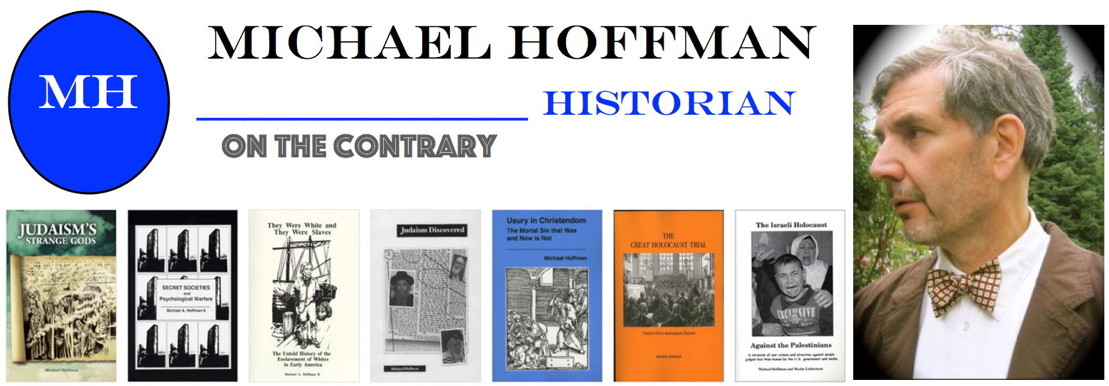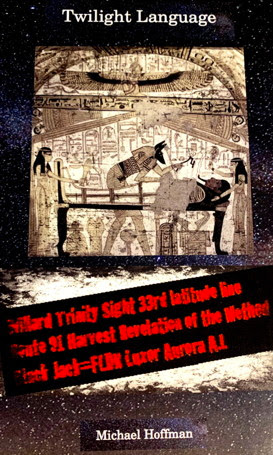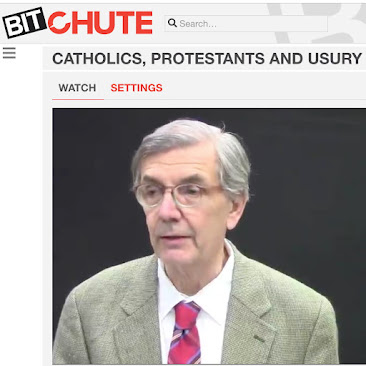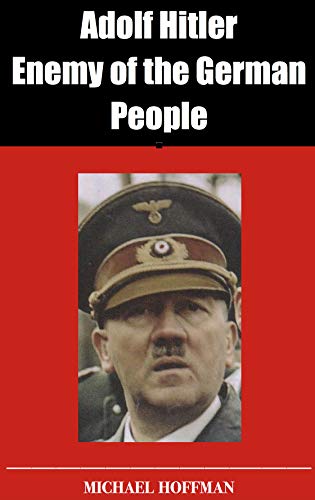Deborah Lipstadt’s former lawyer, Anthony Julius, documents the intellectual dishonesty of Daniel Jonah Goldhagen in today’s Wall Street Journal, Sept. 13, p. A13.
Goldhagen has published a delusional book of 485 pages, The Devil that Never Dies ("antisemitism" is the devil), and Julius is afraid that it is so bad it will embarrass the Zionist thought police; ergo, he reveals Goldhagen's fraudulent quotes and dishes other dirt on Goldhagen and his book, which Julius terms "truly ludicrous."
If you can beg, borrow or buy a copy of today's Wall Street Journal, I would say, do so.
Internecine warfare among the enemies of truth is a delightful spectacle.
Michael Hoffman
P.S. Here is my own critique (at Amazon.com) of a book by Anthony Julius himself:
9 of 20 people found the following review helpful
Gentiles forever on trial in Anthony Julius's Beth Din, May 18, 2010
This review is from: Trials of the Diaspora: A History of Anti-Semitism in England (Paperback)
CENSORSHIP ALERT: This review was first published May 18, 2010 and then removed by Amazon. It was re-published after negotiation with Amazon concerning censorship, on Jan. 30, 2011. The review was again removed the summer of 2012. I am resubmitting it on Aug. 3, 2012. When a review is removed all of the votes it received (pro or contra) are lost, as well as any debate in the comments section. Why has the review been repeatedly removed and then restored? Ask Amazon.There are plenty of unintentionally funny bits in Harold Bloom's fulsome review in the New York Times (May 7, 2010) of Anthony Julius's tedious book, Trials of the Diaspora: A History of Antisemitism in England. The theme of Mr. Julius is that "the Jews are always on trial" and after whining thus, in the familiar full-blown paranoiac pattern, Julius and Bloom proceed to conduct their own Beth din (rabbinic court) inquisition: "Julius casts this huge book as a series of trials, not of the Jews but of the English." (Bloom).
No one may judge the Judaic people, but Julius and Bloom presume to judge the English people. This makes perfect Talmudic sense! Israeli leader Shimon Peres said something similar after the Israeli massacre of Palestinians in Jenin in 2002, when there was a call for a U.N. war crimes investigaton. "No one judges Israel!" Peres shrieked. But counterfeit "Israel" will put western civilization on trial, or at least three of its most eminent writers, Chaucer, Shakespeare and Charles Dickens, along with the English nation as a whole. According to Bloom:
"Trials of the Diaspora takes its title from its final epigraph, Philip Roth's pungent observation in his still undervalued novel Operation Shylock: `In the modern world, the Jew has perpetually been on trial; still today the Jew is on trial, in the person of the Israeli -- and this modern trial of the Jew, this trial which never ends, begins with the trial of Shylock.'...The best chapter in Trials of the Diaspora concerns the cavalcade of anti-Semitism in English literature, with its monuments in Chaucer's Prioress's Tale, Shakespeare's Merchant of Venice and Charles Dickens's Oliver Twist...
"As an old-fashioned bardolator, I am hurt when I contemplate the real harm Shakespeare has done to the Jews for some four centuries now. No representation of a Jew in literature ever will surpass Shylock in power, negative eloquence and persuasiveness....Shakespeare, still competing with the ghost of Christopher Marlowe, implicitly contrasts Shylock with Barabas, the Jew of Malta in Marlowe's tragic farce...It is Shakespeare's continuing triumph over Marlowe that such an exchange will not work. Shylock is darker and deeper forever. For Julius, The Merchant of Venice is both an anti-Semitic play and a representation of (attack on) anti-Semitism. I dispute the latter: the humanizing of Shylock only increases his monstrosity."
If you attend Yale University and seek to plumb the depths of the literature of the West, Prof. Bloom will be your guide --the Prof. Bloom who loves Shakespeare but despises The Merchant of Venice. We can learn an instructive lesson from what Bloom hates about the play. He writes, "No representation of a Jew in literature ever will surpass Shylock in power, negative eloquence and persuasiveness...." Then he relates to us the secret of Shakespeare's power: "... the humanizing of Shylock."
Shakespeare does not make Shylock a stock character of utter revulsion. Shylock is not presented as wholly evil or completely unsympathetic. The Christians in The Merchant of Venice are not completely blameless. The Bard acknowledges Shylock's humanity and presents him as a challenge to the flawed Christians.
Shylock's final arguments are persuasive and almost carry the day, until Portia's speech, wherein she contrasts the Judaic call for "justice" (i.e. vengeance, the "pound of flesh"), with Christ's call for mercy, after which a chasm materializes that Harold Bloom, Anthony Julius and all the Zionist professors and lawyers in the world cannot traverse.
Shakespeare attacked Shylock's ideals; lesser artists would have attacked Shylock himself. They hate the sinner. Shakespeare only hated the sin. Every drama, oration, book, movie or volume of history or theology that denies the humanity of Judaic persons and refuses to love them (Luke 6:27), cannot achieve what Shakespeare achieved: "...the humanizing of Shylock only increases his monstrosity." Call it the Shakespeare Factor, this approach toward enemies, so radically different from the rabbinic mentality which paints enemies, as Bloom and Julius do, in hateful shades of pure evil, is what is missing from many writings that oppose Judaism.
Bloom: "Dickens created the second most memorable Jew in his superb Fagin. There is no third figure to compete with Shylock and Fagin....How does one estimate the lasting harm done by Shakespeare's and Dickens's egregious Jews?...nothing mitigates the destructiveness of the portraits of Shylock and Fagin. The greatness of Shakespeare and of Dickens renders their anti-Semitic masterpieces more troublesome than the litany of lesser but frequently estimable traducers..."
Charles Dickens based Fagin on a real-life receiver of stolen goods, the notorious Ikey Solomons. In a statement after the book's publication, Dickens wrote, "Fagin in Oliver Twist is a Jew because it unfortunately was true of the time to which that story refers that that class of criminal almost invariably was a Jew." Shylock and Fagin are truth-types, not stereotypes, something the Juliuses and Blooms of the world can't accept. The efficacy of Dickens' portrayal of Fagin rests on the Shakespeare Factor: Dickens portrayed Fagin as fully human, animated and lively. The scene of Fagin in prison awaiting execution is suffused with pathos. He is evil, but Dickens puts forth gentiles who are at least as evil (Bill Sikes) or more so (Monks).
Lawyer Julius and Prof. Bloom have a bone to pick with Chaucer (for his testimony about ritual murder in "The Prioress Tale,"), and with Shakespeare and Dickens, and they are not reluctant to demean them out of deference for the offense their attacks may give to western civilization by sullying the memory of its literary giants. This is the one-way prerogative of the Talmudic mentality: they feel entitled to bash-in the faces of our heroes, but when we topple their cherished icons, we are guilty of filthy, stinking bigotry. There is no reciprocity or quid pro quo with imperious personalities like these. They assess our humanity and burnish or damn our reputation predicated upon the degree to which we are willing to succumb to their sense of entitlement.
Bloom engages in some stereotyping of his own: "Julius links anti-Semitism to sadism. He might have done even more with this, since sado-masochism is something of an English vice, and is so much a school-experience of the upper social class."
An English vice. To say that usury or fencing stolen goods are Judaic vices is rabid Shakespearean and Dickensian antisemitism, yet Bloom feels entitled to stigmatize the English as sadomasochist, as people who derive pleasure from extreme cruelty. As one of the Holy People, Bloom can libel the English nation with impunity, while the profound insights of Chaucer, Shakespeare and Dickens constitute an "immemorial stench" (Bloom), out of a "sewer" (Julius).
In his chapter on "The Mentality of Modern English Anti-Semitism," Mr. Julius presents what Prof. Bloom terms, "the puzzle of what appears to be an incessant prejudice, never to be dispelled."
The concept of gentiles harboring never-to-be-dispelled prejudice toward Judaics is a troglodyte dogma taught to bochurim (yeshiva boys). They are indoctrinated from an early age to believe that any opposition to the religion of Judaism is irrational (based on no legitimate grievance) and ineradicable, the assumption being that all opposition to Judaism reflects a hereditary gentile predisposition toward hatred of the Holy People. This traditional rabbinic brainwash is expressed as follows: "Halacha hi beyoduah she'Eisav soneh l'Yaakov" ("It is a given law: it is known that Esau hates Jacob;" cf. Judaism Discovered, pp. 463-466).
It will come as a shock to the acolytes of Julius and Bloom that despite their morally superior liberal pretensions, they are steeped in 2,000 years of Talmudic anti-gentile darkness.
______________________________________________
YOM KIPPUR AND THE KOL NIDREI LIAR'S LITURGY:
FOLLOW HOFFMAN ON TWITTER:
@HoffmanMichaelA
To receive news briefs and special offers by e-mail via "The Hoffman Wire," send an e-mail to hoffman[at]revisionisthistory.org with the words "Subscribe Hoffman Wire" in the subject header.














No comments:
Post a Comment